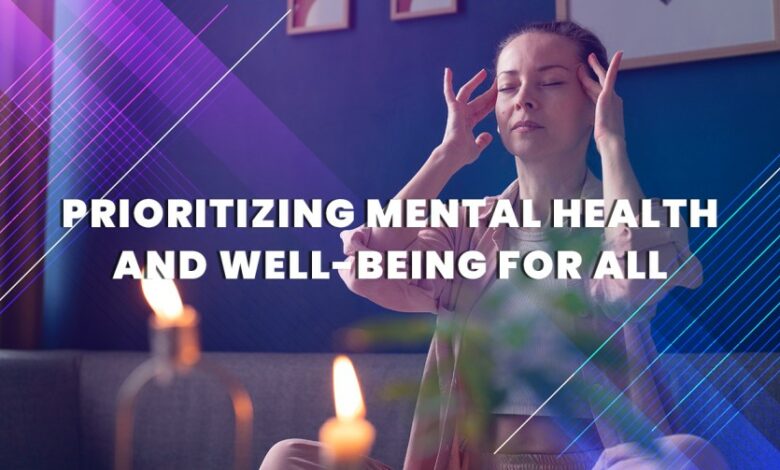The Pros and Cons of Prioritizing Mental Health & Well-being

In an increasingly fast-paced and demanding world, the conversation around mental health and well-being has moved from the fringes to the forefront. What was once a hushed topic is now a crucial aspect of overall health, with individuals and societies alike recognizing its profound impact on quality of life. But like any widespread movement, prioritizing mental health comes with its own set of advantages and challenges.
The Upsides: Why Prioritizing Mental Health is a Game-Changer
The benefits of actively nurturing one’s mental health and well-being are far-reaching, touching every facet of life:
Pros:
- Improved Overall Health Outcomes: A healthy mind often translates to a healthy body. Studies consistently show a strong link between good mental health and reduced risk of chronic physical illnesses, stronger immune systems, and faster recovery times from physical ailments. When you manage stress effectively, you’re less prone to issues like heart disease, digestive problems, and weakened immunity.
- Enhanced Productivity and Performance: When your mind is clear, focused, and resilient, your ability to concentrate, solve problems, and make decisions improves dramatically. This translates to better performance in academics, work, and even daily tasks. Reduced anxiety and improved mood can unleash creativity and efficiency.
- Stronger Relationships: Mental well-being fosters better communication, empathy, and emotional regulation. Individuals who are mentally healthy are often more capable of forming and maintaining meaningful connections, resolving conflicts constructively, and supporting others. This strengthens personal bonds and builds more cohesive communities.
- Increased Resilience and Coping Skills: Prioritizing mental health equips individuals with robust coping mechanisms to navigate life’s inevitable challenges. Learning to identify triggers, practice self-compassion, and develop problem-solving skills helps one bounce back from setbacks, adapt to change, and manage adversity with greater ease.
- Greater Life Satisfaction and Happiness: Ultimately, focusing on mental well-being leads to a more fulfilling and enjoyable life. By addressing emotional struggles, cultivating gratitude, and finding purpose, individuals can experience deeper levels of joy, contentment, and a greater sense of meaning.
- Reduced Stigma: As more people openly discuss their mental health journeys and seek support, the long-standing stigma surrounding these issues begins to erode. This creates a more compassionate and understanding society where individuals feel safer to seek help without fear of judgment.
- Economic Benefits: A mentally healthy workforce is a productive workforce. Companies that invest in employee well-being often see reduced absenteeism, higher morale, and lower healthcare costs, leading to broader economic advantages.
The Downsides: Challenges in the Pursuit of Mental Well-being
While the imperative to prioritize mental health is clear, the journey is not without its hurdles.
Cons:
- Financial Barriers to Access: Quality mental healthcare can be expensive. Therapy sessions, medication, and specialized programs may be financially out of reach for many, especially in regions with limited public health funding or inadequate insurance coverage. This creates a significant disparity in access to essential support.
- Lingering Stigma and Misunderstanding: Despite growing awareness, stigma persists in many communities and workplaces. Fear of judgment, discrimination, or professional repercussions can deter individuals from openly discussing their struggles or seeking necessary help. Some cultures still view mental health issues as a sign of weakness.
- Over-Pathologizing Normal Emotions: In some instances, the increased focus on mental health can lead to the “medicalization” of normal human emotions. Everyday sadness, stress, or grief might be mistakenly labeled as disorders, potentially leading to unnecessary self-diagnosis or over-reliance on external solutions rather than developing natural coping mechanisms.
- Information Overload and Misinformation: The vast amount of information available online, while largely beneficial, can also be overwhelming and, at times, inaccurate. Differentiating credible sources from misleading or unscientific advice can be challenging, potentially leading to ineffective or even harmful self-help practices.
- Pressure to Be “Perfectly Well”: The emphasis on well-being can, ironically, create a new form of pressure – the pressure to always be in a state of positive mental health. This can lead to feelings of inadequacy or guilt when experiencing normal negative emotions, fostering a belief that one must constantly “optimize” their mental state.
- Burnout Among Caregivers and Professionals: The growing demand for mental health support can lead to significant strain and burnout among mental health professionals, therapists, and informal caregivers. This can impact the quality of care and support available.
- Commercialization and “Wellness Washing”: The rising popularity of mental well-being has also led to its commercialization, with an influx of products, apps, and services – some genuinely helpful, others less so. This “wellness washing” can sometimes dilute the true meaning of mental health and prioritize profit over genuine well-being.
Prioritizing mental health and well-being is an undeniable positive step forward for humanity. The vast benefits – from improved health and productivity to stronger relationships and greater life satisfaction – make it an essential pursuit. However, it’s equally important to acknowledge and address the inherent challenges. By working towards affordable and accessible care, continued destigmatization, critical engagement with information, and a balanced approach that embraces the full spectrum of human emotions, we can truly harness the power of prioritizing mental well-being for a healthier, happier, and more resilient future.
Source: http://thepressradio.com





